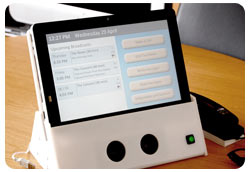‘Virtual tea room’ pilot announced
- 24 July 2009
 |
|
The tablet to be used in |
Intel is at the centre of a social networking pilot to encourage older people who are house bound or socially isolated to engage in social activity.
The company’s technology is being used in the “Building Bridges” pilot, which is being run by the TRIL Centre, a collaboration funded by Intel and IDA Ireland that brings together researchers from three univesities.
The pilot, which will go-live next week, will explore how technology can help support older people, including those who have lost social connections through poor health, retirement and widowhood.
It will use a tablet – designed for use by people inexperienced or lacking confidence in using PCs – to help older people remain connected with friends, family and other members of their community.
The easy-to-use tablet-style device includes a 12 inch touch screen, speakers and IP telephony, daily broadcasts including news, documentaries and stories are streamed to the user.
When the broadcast is over the user can then join a group chat regarding the broadcast or visit a virtual “tea room”, for more a more general conversation with members.
The eight week pilot will involve 20 older people, using a specially designed device, and five friends and family members nominated by each user that are able to take part using a PC client version. The users in the trial will mainly be from UK but some will come from as far as Australia.
The technology was showcased at a media briefing this week on Intel’s latest telehealth technology, held at the International Association of Homes and Services for the Ageing Conference in London.
Simon Roberts, co-principal investigator at Intel, who leads the European social science and design team for product research, said: “We are carrying out a lot of research into social networking, looking at both social loneliness and emotional loneliness particularly of those people who are unable to get out of the house because of a particular condition.”
Niamh Scannell, European research director of Intel’s Digital Health Group, said: “Older people are not afraid of technology they are consumers just like anyone else. As soon as people catch wind of what we are doing, we have huge amounts wanting to join in and play a part in designing their future, so there is a very high self referral rate.”
Intel has already embarked on a number of small trials with the system that have assessed the usability of the product and the success of the user experience, each time they have taken the product back to the lab and refined it.
During the new eight week pilot, researchers will analyse the success using qualitative and quantitative analysis where interviews are held and the usage and functionality of the product is monitored.
The researchers then hope to run a larger randomised control trial, with at least one hundred people at the end of 2009, with the view of making the product commercially available next year.
Link




